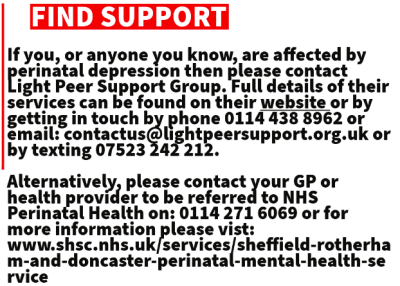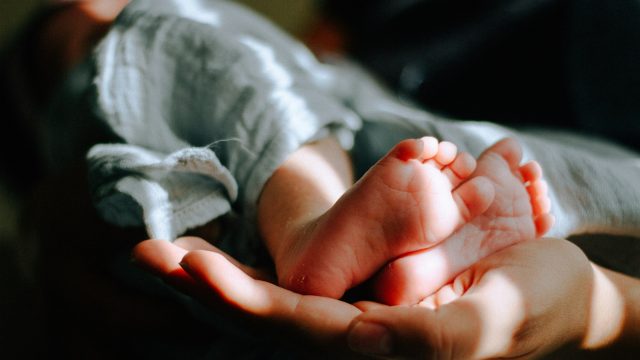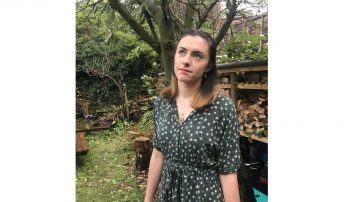When I first became pregnant with my daughter, Isla, it was not the fairytale I had expected. I was 22 at the time and with a partner who constantly put me down. Despite his constant criticism, I did my best to care for the life growing inside me. However, seeing other expecting couples only amplified my feelings of loneliness.
When Isla was born, the first two days passed like a dream. She was perfect. Then one day, while I passed her to my dad so I could shower, I walked back into a nightmare. Isla was gone! I could see my dad holding a baby – but it wasn’t my baby; she couldn’t be. “Where is Isla?” I asked my dad. His confused expression mirrored my distress. “What do you mean? She’s right here!” he replied. But I couldn’t accept that this baby was mine; she was an imposter, and I wanted Isla back.
Rightfully, my parents were very concerned about my health, and before we left the hospital, they told the doctors that something wasn’t right. Despite my parents’ concerns, they were brushed aside and I was discharged later that day. Back at my mum and dad’s, I still couldn’t accept this baby as mine, but I knew I needed to care for it. I know it doesn’t sound logical, but at the time, it made perfect sense – one day Isla would be returned to me.
Although my parents were worried, my partner threatened that the baby would be taken away from me if I confided in anyone, so I kept my feelings to myself. I did a good job of taking care of the baby’s basic needs such as feeding, changing, and bathing. But it was my mum who cuddled and kissed her – even now, they still share an unbreakable bond. Although I would never hurt this stranger’s baby, I couldn’t bring myself to pick her up or have her facing me in her bouncer. I just wanted Isla home.
The first three months of Isla’s life passed in a blur. It was around this time that I moved in with her dad who continued to pull me down and play on my mental distress. I still don’t know why but one day a switch flipped in my brain. Instead of seeing a stranger’s baby, I saw my Isla. She was finally home! This sparked an infatuation that bordered on obsession. I was terrified something bad might happen to her. I couldn’t sleep and when I did I was plagued with nightmares. The next seven months passed in a string of GP visits, sleepless nights, and watchful days.
Being able to recognize Isla made it easy for everyone around me to believe that I had recovered from the mysterious illness that had consumed those early months. Sometimes, it takes someone who isn’t as close to the situation to realise what is happening. In my case, it was my best friend’s mum who voiced her concern by asking me, “Where has Soph gone?” I had been so focused on Isla that I remained oblivious to how badly I was struggling.
This conversation marked the beginning of my recovery journey. After seeing a GP and receiving a diagnosis of postnatal depression, I was quickly put onto medication and referred to LIGHT – a support group for families affected by perinatal mental health illnesses. For the first five weeks, I found the group challenging; it provided support, but I also found myself constantly comparing myself to others, which fed into my phobias surrounding Isla’s wellbeing.
Over time, my mental health began to improve with the help of my support network. When Isla was around 14 months old, I made the difficult decision to leave her dad and moved back in with my parents. My mum became my absolute rock, and despite still struggling with anxiety, I gained enough confidence to start taking Isla to baby groups. However, I never felt like I fitted in with the other women there. A single off-hand remark about me being a young mum was enough to set me back months in my recovery.
For the next year, I continued to try to make up for the first year of Isla’s life. I still feel so guilty about the time I missed or can’t remember. Eventually, I met someone new, and before long, I found out I was expecting my son, Harry. Remembering the first twelve months of Isla’s life sent me into a panic; the further my pregnancy progressed, the more I convinced myself that I was becoming ill again. It didn’t help that this coincided with lockdown, so daily activities like taking Isla for a walk outside ground to a halt.
Due to my struggles with postnatal depression, it was quickly recognised that I was experiencing prenatal depression with Harry. The enormous guilt I felt from being robbed of the first year of Isla’s life pressured me into doing everything right with Harry. To help alleviate my anxieties, I was placed under consultant-led care with the promise of regular scans. However, in reality, they were not able to deliver on this promise. If it wasn’t for the peer support groups from LIGHT, I don’t know what I would have done – being able to open up to someone was a lifesaver.
Harry was born via C-section at the end of 2020. Covid regulations meant that my partner had to leave 20 minutes after Harry was delivered. Then, my worst nightmare started to become a reality when he began vomiting green bile. Once again, I was left alone while my partner accompanied Harry to the Children’s hospital, and I anxiously waited for an update on his condition.
After being checked out, the hospital discharged Harry after three days, and we were allowed to return home. However, our struggles were not over yet. Despite our best efforts, Harry’s weight dropped dramatically in the first 10 days. However, no one would believe me that something was wrong. I felt like my experience of pre-and postnatal depression meant the health visitor only saw me as an anxious mother. Worse, she didn’t believe I was feeding my baby enough and humiliated me by forcing me to breastfeed in front of her.
I refused to be ignored and took Harry back to the hospital multiple times, only to be left feeling like I was being dismissed. I sent my partner to the hospital in the hopes that they would take him more seriously, and they advised a new feeding schedule every two hours. However, Harry continued to get smaller and smaller. I was at my wits’ end. After multiple trips to the Children’s hospital, a new consultant ordered a heel prick test, and within minutes, Harry was rushed onto the ward.
Finally, I had answers to what was happening; Harry had acidic blood that was attacking his organs. With treatment, he was going to be just fine, and I realised something else – I wasn’t an anxious mother or crazy; I was right. There had been something wrong with Harry, and I had been ignored because of my mental distress. This experience validated my thoughts and feelings, and within 4 months, I had come off medication for my anxiety.
Although I will always be in recovery, I am now happily married with two beautiful children, and while some days I experience anxiety, I know that I am not alone. Since January, I have started a job at LIGHT, helping to support women and their partners through their journey with pre/postnatal depression. LIGHT saved me, and I want everyone to know that asking for support or admitting that you’re struggling is one of the bravest things you can do.




